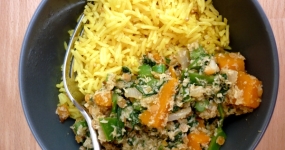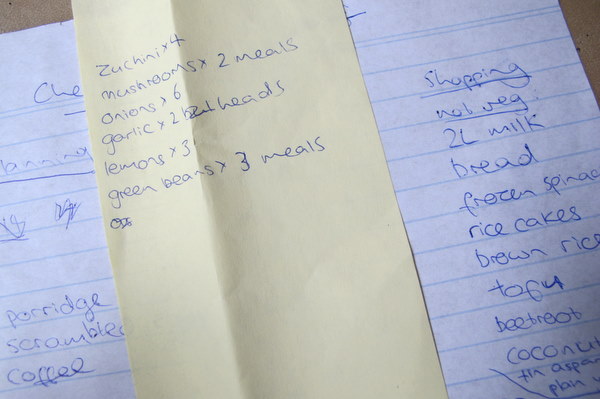I don’t know about you, but I don’t plan on dying of some kind of vitamin or mineral deficiency in the next week. Sure, I could complete The $35 Challenge on nothing but mee goreng, oranges and beer, but that’s not really a sensible way to play it, and I’m nothing if not sensible. Below are my top ten tips for menu planning, your money and sanity saver. And not just during The $35 Challenge.
1. Take stock of your pantry
I just did and there is waaaaaaaaaaaay more stuff in there than I realized. 4 kinds of rice, three shapes of pasta, tins of tomatos, legumes, beetroot, pineapple, tahini, enough condiments and sauces to open a deli, at least 18 different spices and various baking ingredients – sugars, flours, cocoa, almond meal, rosewater, vanilla pods…the list goes on. Any and all of these things can form the starting point for a menu, so take a quick look in your cupboards.
2. Take stock of your fridge/freezer
Before I write a menu, I so often make the mistake of not checking what’s in the fridge or freezer. More condiments. A dozen eggs. Half a kilo of greek yogurt. Five kinds of cheese? All that’s really needed is a shitload of veggies and some meat and I should be able to sort out at least 5 main meals.
3. A menu is just a list
Here’s how you do it: write down every meal you’re going to eat. Then write down every ingredient you don’t already have which is in that meal. Then add anything else to your list that’s not technically part of a meal – snacks, fruit, cleaning products etc.
In fact, why not just write down everything you ate last week as a starting point? Maybe you eat all your lunches out and have toast for breakfast every day. In that case, a menu would just cover dinners. Maybe you order takeaway once a week? This doesn’t have to change, just pencil it in.Suddenly, your shopping list is done.
4. Plan regularly – about as often as you shop
I prefer to shop once a week, so I write a menu once a week. This is a trick I learned from my mum and it’s what has always worked for me. I find fortnightly shops mean I end up with stuff going off or getting forgotten about, and shopping every few days means I end up making a lot more impulse purchases. Find what works for you and stick to it.
5. Be realistic
This is key. You need to be realistic about what you’ll cook, how often you’ll cook and what you’ll actually eat. There are a few dishes that crop up again and again on my menus but never get made because they’re either too boring (chick pea stew anyone?) or too much effort come 6:00pm on a Thursday evening (yes, I will stuff and roast an entire chicken on a week night, without a recipe). Make it easy on yourself.
6. Consider what’s in season
Taste.com.au publishes a monthly list of all the fruit and veg in season. It’s often a good idea to have a look at something like this before you decide what to cook as it will give you some idea of what will be available, tasty and cheap.
7. Be flexible
Maybe you thought you’d serve grilled fish with mashed potato and green beans today – that’s what’s on your menu. But when you get to the supermarket, asparagus and pumpkin are on special, so you change your plans accordingly. Flexibility should also apply to when you want to serve something- just because your menu says taco Tuesday doesn’t mean you can’t switch it to Wednesday ‘cause your plans have changed. In my case, I don’t allocate specific days on my menu – my menu is just a list of meals in no particular order.
8. Throw in a few wildcards
Try and prepare one new dish a week or, failing that, try one new ingredient. Or, use an ingredient in a new way. This will stop your taste buds getting bored. Until recently I’d never really cooked steak or fish (I was vego for 10 years). A few weeks ago I finally tried pineapple as a savoury ingredient when I made this pineapple salsa. Try new things whenever there’s time or the mood takes you.
9. Stop asking yourself ‘what do I feel like eating today’?
If your menu is realistic, flexible and varied, you won’t need to ask yourself this question each day or for each new meal. By taking choice out of the equation on a case-by case basis, you’ve also taken out the work. Once menu planning is a habit, you’ll never look back.
10. Make your final weekly meal ‘odds ‘n ends’
Chances are no matter how meticulous your planning, you’re going to have a few things left at the end of the week. Maybe you didn’t make one of your meals or maybe you just ended up with too much of something. Either way, you can probably whip something up with what you’ve got. Then you’re all ready for your next menu.
It’s not too late to support the $35 Challenge. During Anti-Poverty Week, from October 16-22, participants have $5 a day to spend on food. By experiencing poverty for just 7 days, we come to a better understanding of the realities and stresses of those living in poverty. By blogging or tweeting this experience, we can raise awareness of an issue so often swept under the rug. And by donating the remainder of the money we would usually spend on food to OzHarvest, we can make a real difference.
I’ve said it before and I’ll say it again- eating out will swallow you entire food budget. In fact, not only will it gobble it up, it will also, inexplicably inflate it to the size of a large, cranky walrus.
We all know this, minus the tusks perhaps, and yet we kid ourselves that we don’t know where all our money goes. According to the ABS, as of 2003/2004 the average household expenditure on food is around $150/week. However, the average household expenditure on entertainment is around $125/week. I don’t know about you (well, I know about you food bloggers), but eating out has become one of my main forms of entertainment. That in itself is a worry.
Ok. Deep breath. Here goes. Last week, I spent $166.04 on food.
That is seriously embarrassing for someone who used to make do with so much less. And ok, so we had a friend staying from overseas for a few days, so we ate out more than usual. And we just moved house, so I’m buying groceries a few times a week rather than once a week, and we’ve ordered in a tad more than we usually would…
This is all true, but it’s no excuse for one person to spend nearly $200 on a week’s food!
| Date | Item | Price |
| Sunday 3/10 | popcorn at the movies | $6.90 |
| water + a drink | $5.50 | |
| Monday 4/10 | Groceries – steak, fruit, cheese | $17.00 |
| freddo frog | $1.25 | |
| Tuesday 5/10 | Groceries – veggies, meat, ice cream | $17.50 |
| Lunch – noodles | $9.80 | |
| Wednesday 6/10 | Groceries – pizza ingredients | $13.19 |
| coffee – campos | $13.00 | |
| Thursday 7/10 | toast | $3.00 |
| Friday 8/10 | Sushi | $2.40 |
| Potato wedges | $9.00 | |
| Lunch | $10.00 | |
| Korean food | $45.00 | |
| Saturday 9/10 | groceries | $12.50 |
| $166.04 |
The scary thing is, when you break it down item by item, no one purchase looks unreasonable. Popcorn at the movies? You gotta have popcorn at the movies. Buying steak, fruit and cheese at the grocery store makes perfect sense. And on Thursday, I ran out of milk, so I had to buy toast on the way to work rather than make the porridge I’d planned.
But that’s how it is. These teensy little things add up. And for some people, a serve of toast or a cup of coffee might actually break the budget. Whereas I’m just left mildly confused about what I keep spending all my money on.
Wanna know something even more shocking? I live in a 2 person household. This week, our household spent OVER $400 ON FOOD.
On the plus side, OzHarvest will be getting a healthy donation from me pretty soon.
It’s not too late to support The $35 Challenge. During Anti-Poverty Week, from October 16-22, participants have $5 a day to spend on food. By experiencing poverty for just 7 days, we come to a better understanding of the realities and stresses of those living in poverty. By blogging or tweeting this experience, we can raise awareness of an issue so often swept under the rug. And by donating the remainder of the money we would usually spend on food to OzHarvest, we can make a real difference.
What about you? How much do you usually spend on food?
About me
 Sharing easy recipes, hunting down the best coffee. Honest accounts, nothing too serious. Read more...
Sharing easy recipes, hunting down the best coffee. Honest accounts, nothing too serious. Read more...Recent Posts
- Aerpress means no more shit #travelcoffee and #workcoffee
- Why I write and four ace bloggers who do it better
- The five best things I ate in London
- Shoreditch is awesome, airports are not
- I quit sugar? Do I bollocks.
- Cubao Street Food, Alexandria
- The Reformatory Caffeine Lab, Surry Hills
- Brewtown Newtown
- Stay caffeinated over Christmas
- Gumption by Coffee Alchemy, Sydney CBD
Popular posts this month…
 Sparkling Long Black posted on May 10, 2011
Sparkling Long Black posted on May 10, 2011  Review – Philips Saeco Intelia posted on January 10, 2012
Review – Philips Saeco Intelia posted on January 10, 2012  Kosher Whole Orange Cake posted on July 5, 2011
Kosher Whole Orange Cake posted on July 5, 2011  The quest for Mex part 2 – Feisty Chicken Burritos posted on December 21, 2010
The quest for Mex part 2 – Feisty Chicken Burritos posted on December 21, 2010  Cheat’s Dulce de Leche posted on January 7, 2011
Cheat’s Dulce de Leche posted on January 7, 2011  Sri Lankan Spinach with Coconut posted on December 10, 2010
Sri Lankan Spinach with Coconut posted on December 10, 2010  Why I write and four ace bloggers who do it better posted on July 25, 2014
Why I write and four ace bloggers who do it better posted on July 25, 2014  Rich Portuguese Custard posted on November 29, 2010
Rich Portuguese Custard posted on November 29, 2010
Disclaimer:
All opinions in this blog are mine, an everyday, real-life person. I do not accept payment for reviews and nor do I write sponsored posts. I do not endorse the content of the comments herein.






